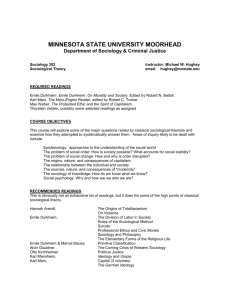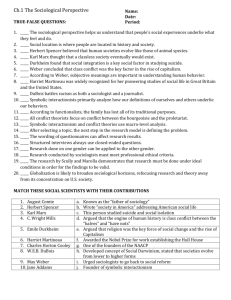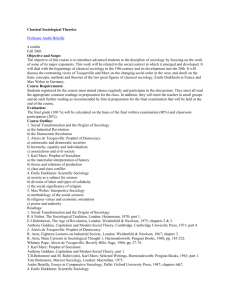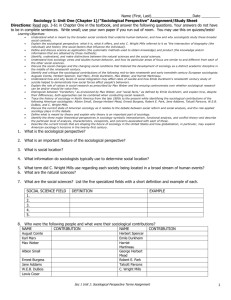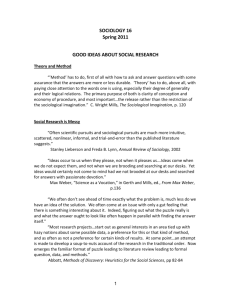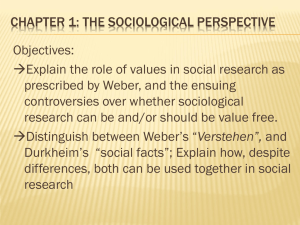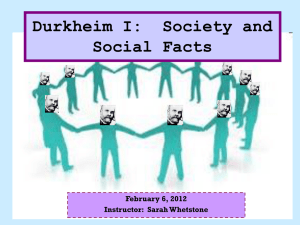Soc 501 - Princeton University
advertisement
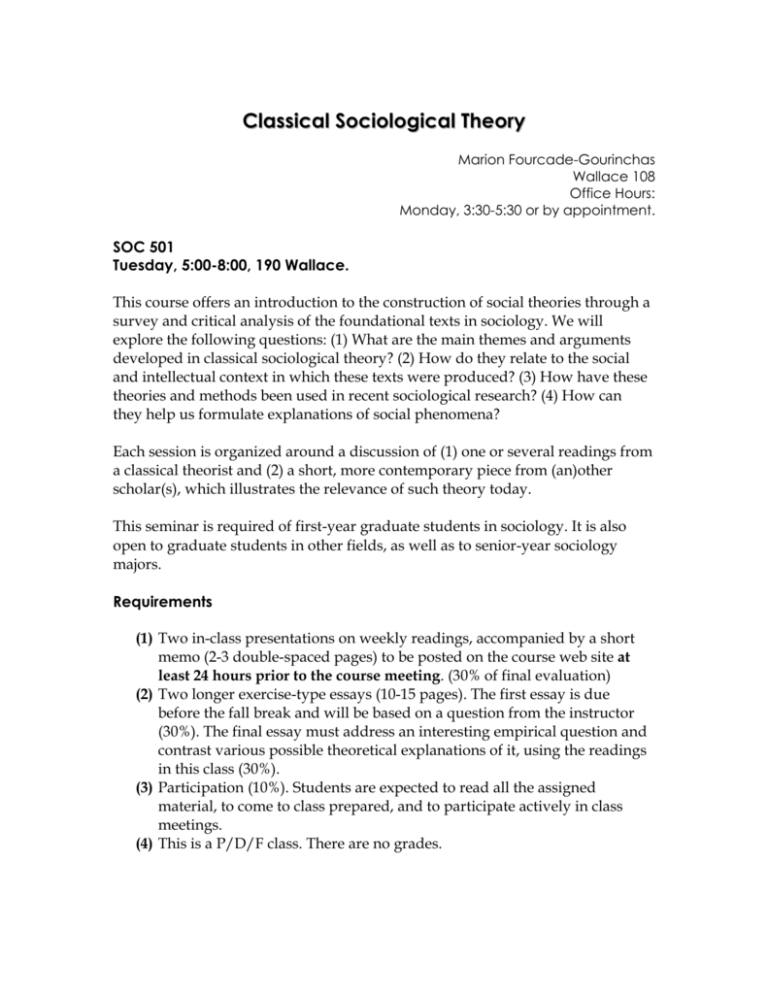
Classical Sociological Theory Marion Fourcade-Gourinchas Wallace 108 Office Hours: Monday, 3:30-5:30 or by appointment. SOC 501 Tuesday, 5:00-8:00, 190 Wallace. This course offers an introduction to the construction of social theories through a survey and critical analysis of the foundational texts in sociology. We will explore the following questions: (1) What are the main themes and arguments developed in classical sociological theory? (2) How do they relate to the social and intellectual context in which these texts were produced? (3) How have these theories and methods been used in recent sociological research? (4) How can they help us formulate explanations of social phenomena? Each session is organized around a discussion of (1) one or several readings from a classical theorist and (2) a short, more contemporary piece from (an)other scholar(s), which illustrates the relevance of such theory today. This seminar is required of first-year graduate students in sociology. It is also open to graduate students in other fields, as well as to senior-year sociology majors. Requirements (1) Two in-class presentations on weekly readings, accompanied by a short memo (2-3 double-spaced pages) to be posted on the course web site at least 24 hours prior to the course meeting. (30% of final evaluation) (2) Two longer exercise-type essays (10-15 pages). The first essay is due before the fall break and will be based on a question from the instructor (30%). The final essay must address an interesting empirical question and contrast various possible theoretical explanations of it, using the readings in this class (30%). (3) Participation (10%). Students are expected to read all the assigned material, to come to class prepared, and to participate actively in class meetings. (4) This is a P/D/F class. There are no grades. Readings The following books are required and have been ordered from the U-store (36 University Place). Additional readings are available from electronic reserves at http://infoshare1.princeton.edu/reserves/elecres.html . Alexis de Tocqueville, 2000, Democracy in America, University of Chicago Press. Robert C. Tucker, ed., 1978, The Marx-Engels Reader, W. W. Norton. H. H. Gerth and C. Wright Mills, eds., From Max Weber, Oxford University Press. Emile Durkheim, 1995 (1912), The Elementary Forms of Religious Life, Simon and Schuster. Emile Durkheim, 1951 (1897) Suicide, The Free Press. Emile Durkheim, 1984 (1893), The Division of Labor in Society. The Free Press. Max Weber, 2001, The Protestant Ethic and the Spirit of Capitalism, Roxbury Publishing Co. Donald N. Levine, ed., 1971, Georg Simmel. On Individuality and Social Forms, University of Chicago Press. Thorstein Veblen, 1994 (1899), Theory of the Leisure Class, Penguin USA. Peter Gay, 1995, The Freud Reader, W.W. Norton, Vintage. Randall Collins, 1994, Four Sociological Traditions, Oxford University Press. Syllabus Week 1. Sept 17. The Historical Emergence of Sociology and the Status of Classical Sociological Theory. Johan Heilbron, 1995, The Rise of Social Theory. Minneapolis: University of Minnesota Press. Introduction, Part III. Randall Collins, 1994, Four Sociological Traditions, Oxford University Press. “Prologue: The Rise of the Social Sciences” Jeffrey Alexander, “The Centrality of the Classics” in Stephen P. Turner, 1996, Social Theory and Sociology: The Classics and Beyond, Blackwell Pub. Craig Calhoun, 1992, “Sociology, Other Disciplines, and the Project of a General Understanding of Social Life”, pp137-196 in T. Halliday and M. Janowitz, eds., Sociology and Its Publics. The Forms and Fates of Disciplinary Organization, University of Chicago Press. Andrew Abbott, 2000, “The Context of Disciplines”, in Chaos of Disciplines, University of Chicago Press. Recommended Connell, R. W., 1967, “Why is Classical Theory Classical?” American Journal of Sociology, May, 1511-57. Immanuel Wallerstein, “The Heritage of Sociology, The Promise of Social Science”, http://fbc.binghamton.edu/iwpradfp.htm Wolf Lepenies, 1988, Between Literature and Science: The Rise of Sociology. Cambridge University Press. Geoffrey Hawthorn, 1987, Enlightenment and Despair: A History of Social Theory, Cambridge University Press. Week 2. Sept 24. Alexis de Tocqueville (1805-1859) Alexis de Tocqueville, 2000, Democracy in America, University of Chicago Press. Book I, Part 1, chapters 1-4; Book I, Part 2, chapters 6-9; Book II Part 1, chapters 1-5, 7-8; Book II Part 2, chapters 1-2, 5, 7-14, 18-19; Book II Part 3, chapter 13. Louis Hartz, 1950, The Liberal Tradition in America, Part One: “Feudalism and the American Experience”, pp. 3-32. Recommended *Alexis de Tocqueville, 1987, The Old Regime and the Revolution, Book II. University of Chicago Press. Francois Furet, 1981, “De Tocqueville and the Problem of the French Revolution”. In Interpreting the French Revolution, Cambridge University Press, Pp132-163. Look at http://www.tocqueville.org/ Week 3. Oct 1. Karl Marx (1818-1883). I. Historical Materialism and the Theory of Classes. Robert C. Tucker, ed., 1978, The Marx-Engels Reader, W. W. Norton. Preface to A Contribution to the Critique of Political Economy, pp3-6 The Economic and Philosophical Manuscripts of 1944, pp. 66-105 German Ideology, pp. 146-199 Manifesto of the Communist Party, pp. 473-491 Class Struggles in France, pp. 586-593 18th Brumaire of Louis Napoleon Bonaparte, pp. 594-617 Erik Olin Wright, 1998, “Posing the Problem: The Agenda of Class Analysis”, Chapter 1 in Classes, Verso. Recommended: *Michael Burawoy and Erik Olin Wright, 2000, “Sociological Marxism”, working paper. http://sociology.berkeley.edu/faculty/burawoy/sociological.pdf Shlomo Avineri, 1971, The Social and Political Thought of Karl Marx, Cambridge University Press. Karl Mannheim, 1985, Ideology and Utopia, Harvest Books. Browse the Marxists Internet Archive on www.marxists.org Week 4. Oct 8. Karl Marx II. The Theory of Capitalist Accumulation. Robert C. Tucker, ed., 1978, The Marx-Engels Reader, W. W. Norton. Wage Labor and Capital, pp. 203-217 Grundrisse, pp. 222-294 Capital, Vol. I., pp. 302-308, 319-361; 419-438 E. P. Thompson, 1982, “Time, Work-Discipline and Industrial Capitalism” in Anthony Giddens and David Held, Classes, Power and Conflict, Berkeley. Recommended Joseph Schumpeter, 1984, “Marx the Economist”, Chapter 3 in Capitalism, Socialism and Democracy, HarperCollins. Robert Heilbroner, 1999, “The Inexorable System of Karl Marx”, pp. 136-170 in The Worldly Philosophers. Simon and Schuster. Week 5. Oct 15. Emile Durkheim (1858-1917). I. Social Morphology. Emile Durkheim, 1951 (1897) Suicide, The Free Press. Introduction. Skim Books I & II. Book III Chapter 1. Emile Durkheim, 1984 (1893), The Division of Labor in Society. The Free Press. Introduction. Book I: Chapters 1, 2, 3 (I, skip II, then III from bottom of p 81 “to sum up”-end), and Chapter 7. Book II: Chapter 1, 2 , 5(III only). Viviana Zelizer, 1994, Pricing the Priceless Child, Princeton University Press. Pp5672. Recommended *Robert Bellah ed., 1973, Emile Durkheim on Morality and Society, Chicago, University of Chicago Press. Gianfranco Poggi, 2000, Durkheim, Oxford University Press. Steven Lukes, 1985, Emile Durkheim: His Life and Work, a Historical and Critical Study, Stanford University Press. Michel Foucault, 1995, “The Body of the Condemned”, Chapter 1 in Discipline and Punish, Vintage Books. Week 6. Oct 23. Emile Durkheim II. The Social Functions of Religion. Emile Durkheim, 1995 (1912), The Elementary Forms of Religious Life, Simon and Schuster, Introduction. Book I, Chapters 1, 4. Book II, Chapters 1, 3, 6, 7. Conclusion. Pierre Bourdieu, 1979, “The Kabyle house or the world reversed.” in Algeria 1960: The Disenchantment of the World, the Sense of Honour, the Kabyle House or the World Reversed. Cambridge University Press. Recommended Mary Douglas, 1984, Purity and Danger. An Analysis of the Concepts of Pollution and Taboo, Routledge. Claude Levi-Strauss, 1971, “Nature and Culture”, pp5-11 in The Elementary Structures of Kinship, Beacon Press. Mid term essay due Oct 24. Oct 28. No class (fall recess) Week 7. Nov 5. Max Weber (1864-1920) I. Religion and Capitalism. H. H. Gerth and C. Wright Mills, eds., From Max Weber, Oxford University Press. “The Social Psychology of the World Religions”, pp. 267-301 “The Protestant Sects and the Spirit of Capitalism”, pp. 302-322 Max Weber, 2001, The Protestant Ethic and the Spirit of Capitalism, Roxbury Publishing Co., Chapter 2, “The Spirit of Capitalism”. Robert Wuthnow, 1996, Poor Richard’s Principle, Chapter 3, “Moral Tradition: the Lost Ambivalence of American Culture”, pp. 59-82. Recommended *Wolfgang Schluchter, 1979, “The Paradox of Rationalization: On the Relation of Ethics and the World” in Guether Roth and Wolfgang Schluchter, Max Weber’s Vision of History: Ethics and Methods, University of California Press. *Max Weber, 1978, Economy and Society, Chapter 1 “Basic Sociological Terms”, pp. 3-62 *Max Weber, 1980, General Economic History, Chapter 4, “The Birth of Modern Capitalism”, Transaction Pub. *Randall Collins, 1992, “Weber’s Last Theory of Capitalism” in M. Granovetter and R. Swedberg, The Sociology of Economic Life, Westview Press. Wolfgang Schluchter, 1989, Rationalism, Religion, and Domination : a Weberian Perspective, University of California Press. Fritz Ringer, 1997, Max Weber’s Methodology: The Unification of the Cultural and Social Sciences, Harvard University Press. Albert O. Hirschman, 1977, “Reflections on an Episode in Intellectual History”, pp117-135 in The Passions and the Interests, Princeton University Press. Week 8. Nov 12. Max Weber II. Power / Domination / Rationalization. H. H. Gerth and C. Wright Mills, eds., From Max Weber, Oxford University Press. “Structures of Power”, pp. 159-179 “Class, Status and Party”, pp. 180-195 “Bureaucracy”, pp. 196-244 “Politics as Vocation”, pp. 77-128. Max Weber, 1978, “The Types of Legitimate Domination”, Economy and Society, University of California Press. Pp. 212-254. Paul DiMaggio and Walter Powell, 1983, “The Iron Cage Revisited: Institutional Isomorphism and Collective Rationality in Organizational Fields”, American Sociological Review, 48, 147-60. Recommended: *Rogers Brubaker, 1988, The Limits of Rationality: An Essay on the Social and Moral Thought of Max Weber, Unwin Hyman. Max Weber, 1978, “Domination and Legitimacy”, Economy and Society, University of California Press. Pp. 941-955. Week 9. Nov 19. Georg Simmel (1858-1918). A Sociology of Forms. Donald N. Levine, ed., 1971, Georg Simmel. On Individuality and Social Forms, University of Chicago Press. Pp. 3-25, 41-149, 251-294. Ron Breiger, “The Duality of Persons and Groups”, Social Forces, 1974, 53, 2, Dec, 181-190. Recommended *Kurt Wolf, 1985, “Introduction” in The Sociology of Georg Simmel, New York: The Free Press. Georg Simmel, 1964, “Competition” in Conflict and the Web of Group Affiliations, The Free Press. Week 10. Nov 26. Thorstein Veblen (1857-1929). A Sociology of Consumption. Thorstein Veblen, 1994 (1899), The Theory of the Leisure Class, Penguin Classics. Chapters 1-8. Pierre Bourdieu, 1987, Distinction. A Social Critique of the Judgement of Taste. Harvard University Press. “Conclusion: Classes and Classifications”, Pp466-484. [Also useful, but not required: Chapter 1, Part II] Recommended: David Riesman, 1995, Thorstein Veblen, Transaction Pub. Robert Heilbroner, 1999, “The Savage Society of Thorstein Veblen”, pp. 136-170 in The Worldly Philosophers. Simon and Schuster. Week 11. Dec 3. Sigmund Freud (1856-1939). Psychoanalysis and Social Control. Peter Gay, 1995, The Freud Reader, xiii-xxiii, 129-171, 481-510, 685-771. Norbert Elias, 1994 (1937), The Civilizing Process. Pp42-88, 95-105, 443-56, 460-465 Recommended: Peter Gay, 1998, Freud: A Life for our Time. W. W. Norton. Nancy Chodorow, 1999 (first ed. 1978), The Reproduction of Mothering, University of California Press. Film: Dream sequence from Spellbound (Alfred Hitchcock / Salvador Dali). Week 12. Dec 10. Other Currents. Synthesis and Conclusion. Randall Collins, 1994, Four Sociological Traditions, University of Chicago Press. “The Utilitarian Tradition” and “The Microinteractionist Tradition”. Final essay due Dec 14.
